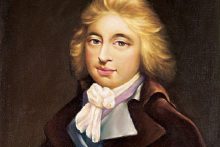Dusík ranks among the most important and most interesting composers of Czech and European music at the beginning of the 19th century. In his time he was one of the most famous pianists, composers and music teachers. Although he was born in the era of high classicism, his musical language and sensitivity had from his very first works tended toward the 19th century, toward the group of the first composers of the Romantic period (Schubert, Weber, Mendelssohn, Chopin et al.).
He remained throughout his whole life true to the piano: he can be credited for further technical improvement in and development of the instrument, and it was for the piano that he composed the greatest part of his works: of his more than three hundred compositions, the overwhelming majority are for solo piano or piano concertante accompanied by other instruments. He also composed masses, the orchestral overture Feudal Times and the opera The Captive of Spilberg as well as other works, notably for harp and voice.
Born in Čáslav, he received his first instruction in music from his father, an excellent musician and teacher. After studies at gymnasia in Jihlava, Kutná Hora and Prague and after a brief period as a philosophy student at the university in Prague, he went off at the invitation of Count Männer to the Netherlands, where he began his career as a concert pianist, composer and teacher. He undertook several successful concert tours of Europe and Russia. In 1786 he was invited to pursue his art in France. Dusík accepted the invitation and eventually settled down in Paris. Having been a favorite of Queen Marie Antoinette and a visitor in aristocratic salons, he was forced to flee during the French Revolution. He escaped to London, where in short time he established himself very comfortably: he had students, some from the very highest social circles; he was a successful concert pianist; and his compositions found great favor there.
He married in 1792, and with his father-in-law, Domenico Corri, he founded a music publishing house. It went bankrupt after a few years, and Dusík again had to flee, this time from his creditors. He spent nearly two years in Denmark and Germany and in 1802 visited the Czechlands, giving several immensely successful concerts in Prague and Čáslav. He turned down the offers he received in the Czechlands, and in 1803 he entered the service of the Prussian prince Louis Ferdinand, a very gifted pianist and composer. The prince became Dusík's student, fellow-performer and friend, but then he was killed in 1806 in one of the battles of the Napoleonic wars. Grief-stricken, Dusík honored the memory of his fallen friend with one of his most beautiful compositions, the Élégie harmonique sur la mort de Louis Ferdinand de Prusse op.61. This Élégie marks the onset of the final period both of Dusík’s life and of his creative activity.
He spent a short time in the services of Prince Isenburg, and then in 1808 he returned to Paris and accepted the position of household music teacher and concert organizer for Prince Talleyrand. His last public concert took place in October of 1810. By that time Dusík was seriously ill: his unhealthy lifestyle and depression brought his life to an untimely end at the age of only fifty-two.
The level of his works varies owing to a certain haste in his composition, this in turn due to his own need to concertize. We find compositions of relatively conventional form juxtaposed with works of intensely Romantic expression. The melody lines of some of his motifs are strikingly similar to certain Czech folk songs.
His works frequently reflect his thoughts and tribulations. They offer a subjectivism up until that time unknown, the piano becoming for him an instrument of personal utterance (for example, the sonatas titled Elegie harmonique, Les Adieux, Le retour à Paris, L´Invocation, La Consolation and Fantasia op.76).
His works are original, timeless and for his era unique, and they helped prepare the ground for the rise of a new trend in music, Romanticism; they brought Dusík himself the title of "prophet of music."
Author: Josef Prokop
*12 February 1760 Čáslav† 20 March 1812 St. Germain-en-Laye near Paris
